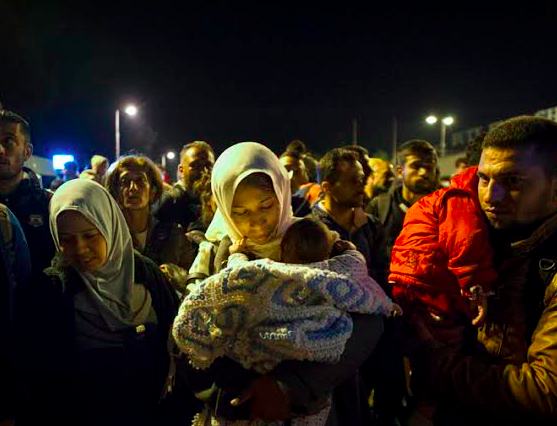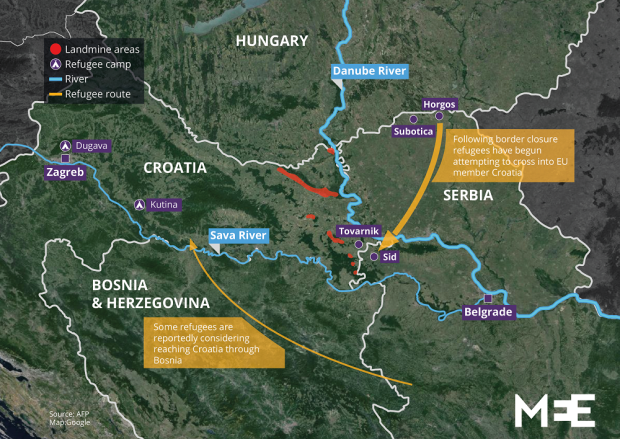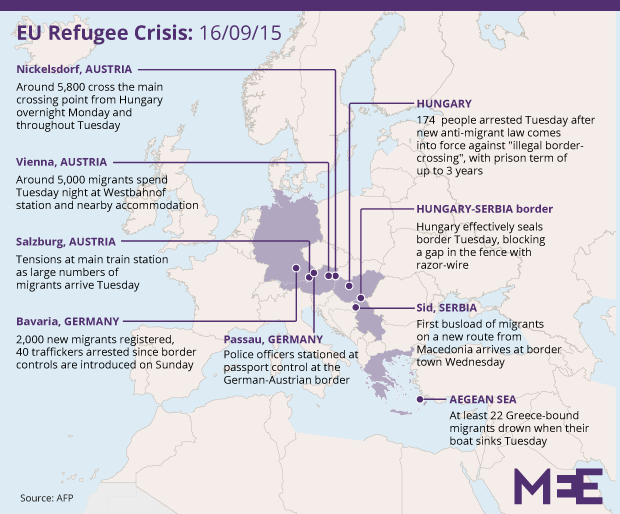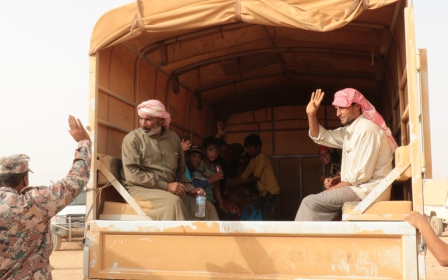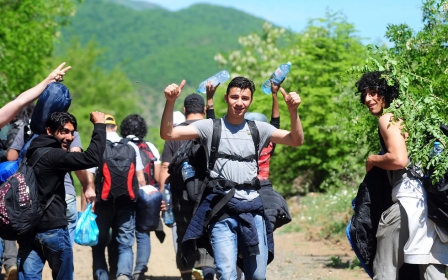Hungary cracks down as migrants head to Croatia
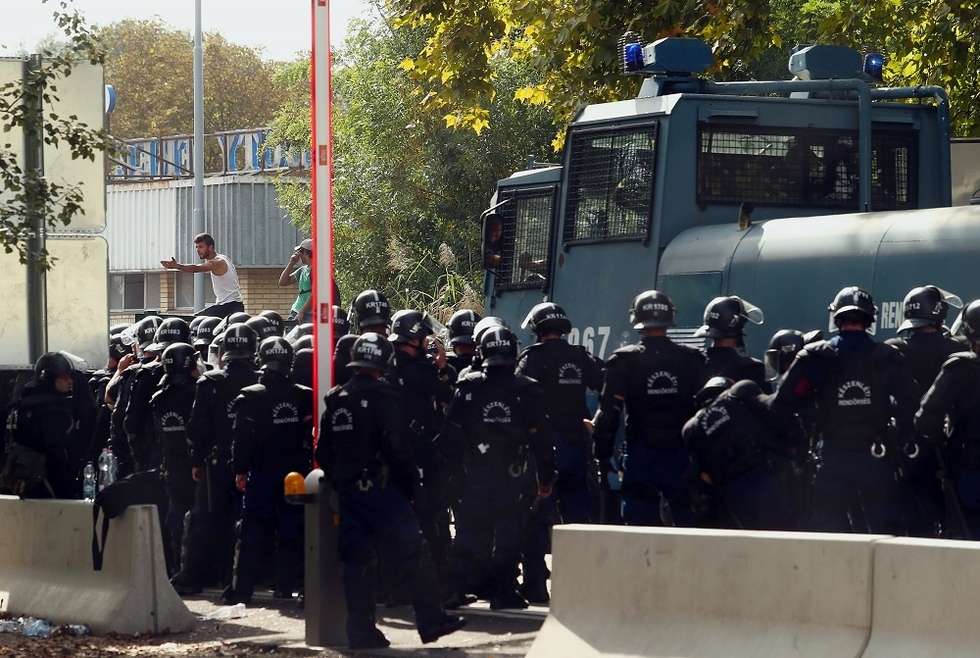
Hungarian police have fired tear gas and water cannon in an attempt to disperse between 300 and 500 refugees and migrants who had begun to protest over the ongoing border closure.
"The crowd on the Serbian side became aggressive and threw stones, bottles and sticks at police on the Hungarian side and crossed the barrier at the border," a police statement said on Wednesday afternoon.
The Hungarian government said that 20 police officers were injured.
Special Forces reinforcements arrived to help move the crowd, which had tried to break through the border and the no-man’s land established by the authorities.
The border was first closed early on Tuesday, with harsh new border controls imposed. In about 24 hours, hundreds of people were reportedly arrested for crossing illegally into the country, the police said.
As of Tuesday evening, about 1,000 refugees and migrants were said to be on the border, Serbian sources told Middle East Eye, although the numbers were fluctuating constantly.
Thousands are also believed to be in Serbia, with many more in Greece and Macedonia. On Wednesday, Greek police said about 5,000 people crossed from the country's northern border into Macedonia in the last 24 hours and were expected to try and continue north.
Refugees arrive in Croatia
The closure of the Hungarian border has since sent hundreds of refugees heading to neighbouring Croatia, which has been largely unscathed by Europe’s refugee crisis.
Croatia has said that it will not close its borders and has begun processing new arrivals, but concerns are growing that the incoming refugees could become caught up in mine fields that have been left over from the Yugoslav Wars in the 1990s and still line the border.
People are being advised to not stray more than 50 metres from the main road, with police being sent to the affected areas, Croatian authorities said.
Adam Komorowski, the commercial director at UK-based Mines Advisory Group, told MEE that while the mine fields have all been marked the "refugee crisis has put them back into play as a serious issue because people are likely to take much more risk".
Roberu Haddadu, a Syrian from Latakia, said he was trying to make it to Germany to continue his mechanical engineering degree. He told Croatian daily, Jutarnji List that he was planning to head from Serbia to Croatia, but that he didn't realise that Serbia and Croatia had been at war and that there were still mine fields separating them. He also told the paper he didn’t know that the River Danube stretched for much of the border and would be difficult to cross.
Police have been sent to the border to try and prevent people from entering the mine fields, with Prime Minister Zoran Milanovic saying that his government had been running simulations about possible scenarios for weeks, although specifics are yet to emerge.
(Translation: [Croatian Prime Minister Zoran] Milanovic We are ready for refugees. We've talking about this for weeks and doing simulations. Croatia can care for thousands of people.)
"They will be able to cross Croatia and we have been working intensively on that," Milanovic told parliament. "We are ready to accept and direct those people - their religion and skin colour is completely irrelevant - to where they apparently wish to go ... Germany, Scandinavia."
The Croatian president Kolinda Grabar-Kitarovic has also called a meeting of the country’s top security body over the issue.
About 6,000 border police have been deployed, with Croatia saying that it can house roughly 3,000 refugees and migrants in different kinds of facilities. The Kutina and Dugava refugee camps are supposed to be housing the majority of those coming in, Vecernji List said.
Those who have been apprehended are either being fingerprinted, which under EU laws requires them to seek asylum in Croatia, or are being told to leave the country, local media reported.
The Austrians have also tightened controls overnight and have begun checking cars entering from Hungary and said they could also beef up border controls from Slovenia. The authorities insist that Syrians and refugees coming from countries where they are at risk of violence or persecution could continue to apply for asylum.
Hungary considers Serbia and other Balkan states to be "safe third countries" and argues that there is no humanitarian grounds to allow people to cross. The UN's refugee agency, UNHCR, however, has called this into question, saying that Serbia is still wrestling with its own internal refugees left over from the wars in the 1990s. The International Organization for Migration (IOM) in Hungary has querying whether the decision was in contravention of EU rules, with the Council of Europe likewise expressing concern.
“What we are seeing along the border is how hundreds of men, women and children are suffering the dire consequences of the Hungarian authorities’ appalling lack of humanity in closing and militarizing the border yesterday,” said Tirana Hassan, director of crisis response at Amnesty International, currently in Horgos on the Serbia-Hungary border, said.
“The Serbian authorities had full knowledge this was coming and yet failed miserably to respond. Thousands of people fleeing war are seeking protection in EU countries. Instead of coming to their aid, European governments are fencing them off and seem incapable of finding longer-term solutions.”
All of those found crossing illegally on Tuesday were arrested. Of these, 316 will be prosecuted for damaging a barbed-wire fence separating the Hungary-Serbia border, while the remaining 51 will be prosecuted for illegally entering the country, the police added. Those found guilty of illegal entry face up to three years in jail while anyone found damaging the fence faces up to three years in jail or deportation.
The arrests were the first in Hungary since it introduced tough new border regulations and subsequently closed many of the main border crossings while also imposing a state of emergency in some southern provinces.
The border crackdown follows the arrival of nearly 10,000 refugees and migrants in Hungary on Monday alone. They also said that 200,000 migrants have passed through Hungary so far this year, although the vast majority chose to transit through Hungary on their journey to places like Germany and Sweden.
Middle East Eye propose une couverture et une analyse indépendantes et incomparables du Moyen-Orient, de l’Afrique du Nord et d’autres régions du monde. Pour en savoir plus sur la reprise de ce contenu et les frais qui s’appliquent, veuillez remplir ce formulaire [en anglais]. Pour en savoir plus sur MEE, cliquez ici [en anglais].


